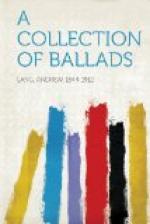Her foes they besett her on everye side,
As thinking close siege shee cold never abide;
To beate down the walles they all did decree:
But stoutlye deffyd them brave Mary Ambree.
Then tooke shee her sword and her targett in hand,
And mounting the walls all undaunted did stand,
There daring their captaines to match any three:
O what a brave captaine was Mary Ambree!
“Now saye, English captaine, what woldest thou
give
To ransome thy selfe, which else must not live?
Come yield thy selfe quicklye, or slaine thou must
bee:”
Then smiled sweetlye brave Mary Ambree.
“Ye captaines couragious, of valour so bold,
Whom thinke you before you now you doe behold?
“A knight, sir, of England, and captaine soe
free,
Who shortlye with us a prisoner must bee.”
“No captaine of England; behold in your sight
Two brests in my bosome, and therefore no knight:
Noe knight, sirs, of England, nor captaine you see,
But a poor simple mayden called Mary Ambree.”
“But art thou a woman, as thou dost declare,
Whose valor hath proved so undaunted in warre?
If England doth yield such brave maydens as thee,
Full well mey they conquer, faire Mary Ambree.”
The Prince of Great Parma heard of her renowne,
Who long had advanced for England’s fair crowne;
Hee wooed her and sued her his mistress to bee,
And offered rich presents to Mary Ambree.
But this virtuous mayden despised them all:
“’Ile nere sell my honour for purple nor
pall;
A maiden of England, sir, never will bee
The wench of a monarcke,” quoth Mary Ambree.
Then to her owne country shee back did returne,
Still holding the foes of rare England in scorne!
Therfore English captaines of every degree
Sing forth the brave valours of Mary Ambree.
Ballad: Alison Gross
O Alison Gross, that lives in yon tow’r,
The ugliest witch in the north countrie,
She trysted me ae day up till her bow’r,
And mony fair speeches she made to me.
She straik’d my head, and she kaim’d my
hair,
And she set me down saftly on her knee;
Says—“If ye will be my leman sae
true,
Sae mony braw things as I will you gi’e.”
She shaw’d me a mantle of red scarlet,
With gowden flowers and fringes fine;
Says—“If ye will be my leman sae
true,
This goodly gift it shall be thine.”
“Awa, awa, ye ugly witch,
Hand far awa, and let me be;
I never will be your leman sae true,
And I wish I were out of your company.”
She neist brocht a sark of the saftest silk,
Weel wrought with pearls about the band;
Says—“If ye will be my ain true love,
This goodly gift ye shall command.”
She show’d me a cup of the good red gowd,
Weel set with jewels sae fair to see;
Says—“If ye will be my leman sae
true,
This goodly gift I will you gi’e.”




